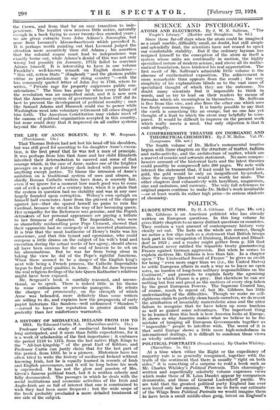THE LIFE OF ANNE BOLEYN. By P. W. Sergeant. (Hutchinson.
18s.) That Thomas Boleyn had not lost his head off his shoulders, but was still good for assenting to his daughter Anne's execu- tion, is the best proof that he was not a man of principle. It was perhaps from him that Anne and her child Elizabeth inherited their determination to succeed and some of that courage which, in the case of Anne, makes one of the brighter passages on a page of history dark indeed with passions for anything except justice. To blame the intrusion of Anne's ambition on a traditional system of uses and abuses, as chiefly Roman Catholic writers have done, is scarcely fair, even if we ignore for a moment how much good was to come out of evil a quarter of a century later, when it is plain that the system in question had no stability and was in any case largely founded upon corruption. Wolsey's own epitaph on himself half exonerates Anne from the gravest of the charges against her—that she spared herself no pains to ruin the Cardinal, because he stood in the way of her becoming queen. Her sympathy for the Reformers was genuine, and the Popish detraotors of her personal appearance are paying a tribute to her firmness of character. The Imperialists, who were so shamefully mishandling poor Pope Clement, showed that their opponents had no monopoly of an inverted pharisaism. It is true that the most loathsome of Henry's traits was his conscience, and that this tyrant and egomaniac, who could compose a little drama on the subject of his wife's trial and execution during the actual weeks of her agony, should above all have been anxious for the seal of heaven to be set on his abominations. But he was far from being alone in taking the view he did of the Pope's rightful functions. When there seemed to be a danger of the English king's next wife being a French princess, the Catholic Imperialists began to find good qualities in Anne. But for Jane Seymour the real religious feelings of the late Queen Katharine's relatives might have been exposed.
Mr. Sergeant's book is carefully reasoned, and unemo- tional, so to speak. There is indeed little in his theme to rouse enthusiasm or provoke panegyric. He rebuts the charges of promiscuity, on the strength of which Anne was beheaded, more definitely than some writers are willing to do, and explains how the propaganda of early papist historians like Sanders—well nicknamed " Slanders ' —served to leave her reputation in greater doubt with posterity than her misfortunes warranted.










































 Previous page
Previous page